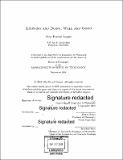| dc.contributor.advisor | Kieran Setiya. | en_US |
| dc.contributor.author | Jaques, Abby Everett, Ph. D. Massachusetts Institute of Technology | en_US |
| dc.contributor.other | Massachusetts Institute of Technology. Department of Linguistics and Philosophy. | en_US |
| dc.date.accessioned | 2019-03-01T19:57:35Z | |
| dc.date.available | 2019-03-01T19:57:35Z | |
| dc.date.copyright | 2018 | en_US |
| dc.date.issued | 2018 | en_US |
| dc.identifier.uri | http://hdl.handle.net/1721.1/120679 | |
| dc.description | Thesis: Ph. D., Massachusetts Institute of Technology, Department of Linguistics and Philosophy, 2018. | en_US |
| dc.description | Cataloged from PDF version of thesis. | en_US |
| dc.description | Includes bibliographical references. | en_US |
| dc.description.abstract | My dissertation explores the relationship between intentional action and knowledge. I argue that understanding this relationship is not only of central importance to action theory; it is also a means to progress on questions about the nature of knowledge, the mechanisms of oppression, and the foundations of ethics. The opening chapter argues for my view of the nature of intentional action. I show that it is distinguished from nearby phenomena by an aim of control-and that this control turns out to be Anscombean practical knowledge, the special knowledge an agent can have of what she is doing, how, and why. The second chapter considers how my view about the knowledge-action relationship differs from those advocated by 'shifty epistemologists'-theorists who claim that what you know depends on practical factors like what's at stake for you. I argue that my view undermines the motivation for this claim and may debunk it. The third chapter presents a new way of understanding epistemic injustice and describes how epistemic injustice (thus understood) interacts with action's constitutive aim of practical knowledge to cause shackling-a distinctive dilemma faced by marginalized agents that both manifests and constitutes oppression. The fourth chapter shows how my view of the nature of intentional action entails a new kind of constitutivism about practical reason. I raise a worry that this form of constitutivism threatens the existence and/or generality of moral reasons before suggesting some possible ways out. | en_US |
| dc.description.statementofresponsibility | by Abby Everett Jaques. | en_US |
| dc.format.extent | 177 pages | en_US |
| dc.language.iso | eng | en_US |
| dc.publisher | Massachusetts Institute of Technology | en_US |
| dc.rights | MIT theses are protected by copyright. They may be viewed, downloaded, or printed from this source but further reproduction or distribution in any format is prohibited without written permission. | en_US |
| dc.rights.uri | http://dspace.mit.edu/handle/1721.1/7582 | en_US |
| dc.subject | Linguistics and Philosophy. | en_US |
| dc.title | Knowing and doing, well and good | en_US |
| dc.type | Thesis | en_US |
| dc.description.degree | Ph. D. | en_US |
| dc.contributor.department | Massachusetts Institute of Technology. Department of Linguistics and Philosophy | |
| dc.identifier.oclc | 1088557685 | en_US |
